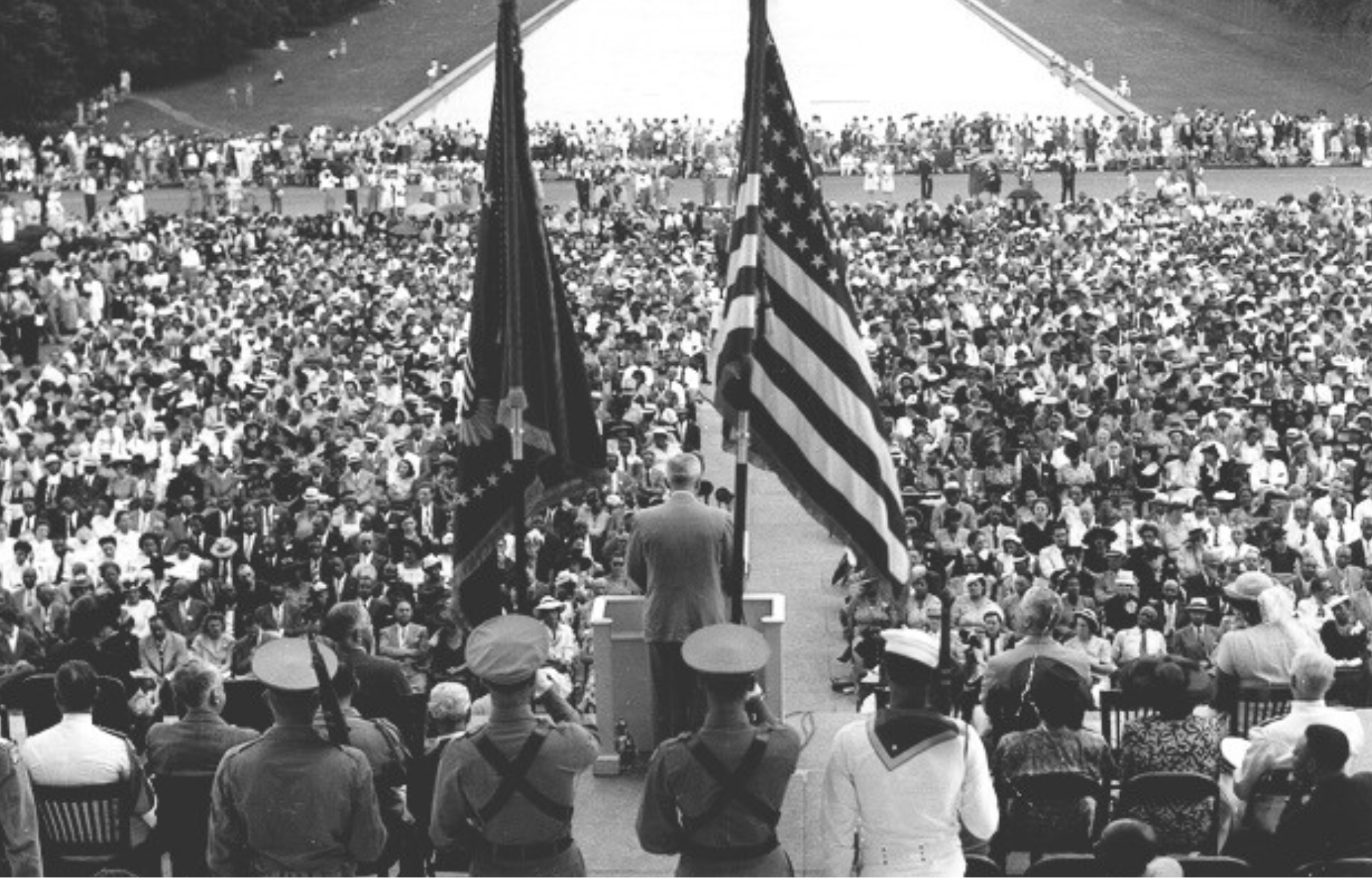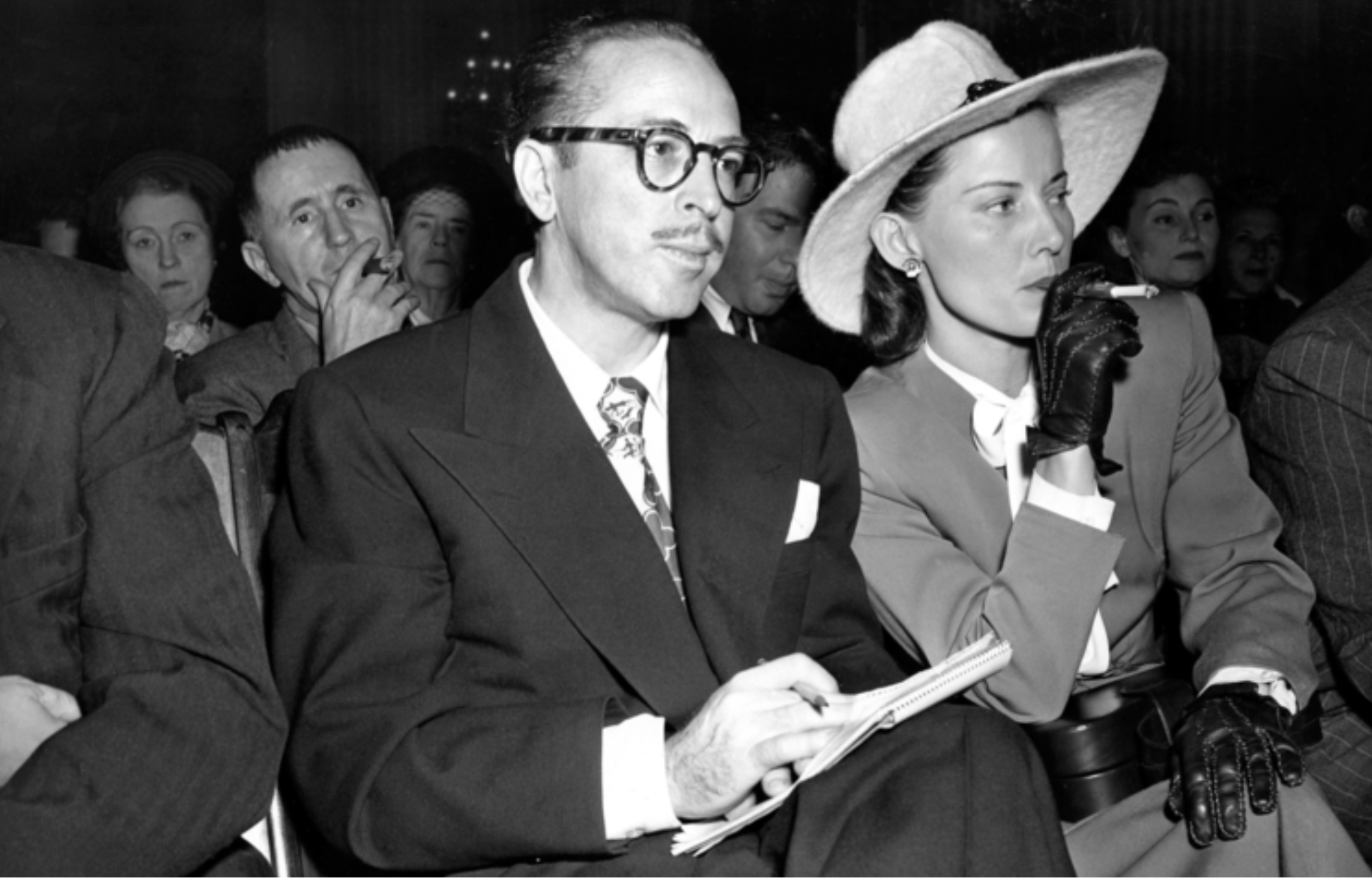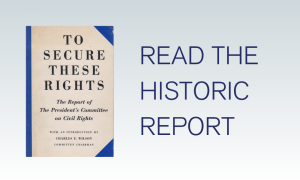TO SECURE THESE RIGHTS
By Steven F. Lawson, Professor Emeritus, Rutgers University
PART X: THE COMMITTEE DELIBERATES
Although President Truman did not comment publicly on the violations of federal law that the freedom riders experienced, he did lend his support to those civil rights advocates with whom he had developed a close relationship. He favored the moderate approach of the NAACP, which promoted equality through lawsuits and legislation, rather than that of militant groups like CORE, which practiced civil disobedience. On June 29, 1947, he became the first chief executive to deliver an address to the NAACP. The setting fit the occasion well, as Truman spoke to a crowd of more than fifteen thousand at the Lincoln Memo rial. His words carried even farther as they were broadcast live on national radio. His speech, drafted in large part by Robert Carr and Milton Stewart, reflected the thinking of the PCCR staff. Truman told his audience that the nation could not afford to wait any longer to remedy its racial evils and that the federal government must become the “friendly vigilant defender of the rights and equalities of all Americans.” African Americans deserved no less, but it was also essential to the country’s cold war struggle with the Soviet Union “that we have been able to put our own house in order.”67 Truman delivered the most powerful speech on civil rights of any president before him. The chief executive recognized that he had come a long way from his racist upbringing in small-town Missouri. He confided to his sister that he knew “Mama won’t like what I have to say because I wind up quoting old Abe [Lincoln]. But, I believe what I say.”68

President Truman speaks from the steps of the Lincoln Memorial, the first sitting U.S. president to address the NAACP (June 29, 1947). Courtesy Truman Library, photo 73-2561
The day after Truman’s remarks, which Rabbi Gittelsohn praised as “beautiful,” the PCCR met at Dartmouth College to draft its report. The committee easily reached agreement on most proposals. Numerous witnesses had pointed out the fundamental importance of the right to vote as the cornerstone for achieving first-class citizenship and ensuring personal safety. Sadie Alexander wanted to go further than her colleagues by recommending her “pet” project: invoking the Fourteenth Amendment to reduce congressional representation of those states that denied citizens the right to vote. The committee rejected this proposal as “impractical” and worried that some southern states would accept the reduction in representation to keep blacks from the suffrage.69 The committee also sketched out support for desegregation of interstate transportation, public accommodations, and the military. It favored strengthening sections 51 and 52 of the federal criminal code to enhance the power of the Justice Department to prosecute civil rights crimes. The committee drew up strong proposals against lynching and for desegregation of Washington D.C., the creation of a permanent FEPC, and the reorganization of the Civil Rights Section of the Justice Department.
The PCCR had much more difficulty in deciding what to do about public school segregation, elimination of federal grants to segregated institutions, the performance of the FBI in civil rights investigations, and the federal loyalty programs. School desegregation posed the greatest problem for Tilly and Graham, the two white southern committee members. Both liberals, they nonetheless believed in placing the emphasis on the right to vote, because as Tilly feared, “the South will stay ignorant before it will be forced to having non-segregated schools.” They cautioned that federal action in this area would precipitate fierce white opposition and endanger otherwise hopeful progress in race relations in the postwar South.70 The committee also squabbled over the closely related issue of earmarking federal funds for education only for those schools that prohibited segregation and discrimination. Tilly and Graham received support from the other college president, Dickey, and from Bishop Sherrill and Luckman, all of whom agreed that cutting off grants to segregated southern schools would harm black and white children alike. On the other side, the strongest support for the measure came from Alexander, Tobias, Ernst, and Gittelsohn. Shiskin, Matthews, and Roosevelt eventually provided them with the majority in favor of the school desegregation recommendations.71
The PCCR also vigorously debated an issue related more to civil liberties than civil rights. On March 21, 1947, Truman issued an executive order establishing a federal loyalty board to investigate the background of government employees for ties to subversive organizations, particularly the Communist party and affiliated groups. The loyalty board’s deliberations showed little regard for due process, and the definition of what constituted disloyalty remained vague. At the same time, the House Committee on Un-American Activities was conducting its own investigation into the influence of Communism in the Hollywood movie industry, and had punished ten witnesses who refused to answer its questions satisfactorily. Many civil libertarians regarded these investigations into political beliefs as a violation of the First Amendment’s protection of freedom of speech—or in this case freedom not to speak—and freedom to join whatever groups one pleased.

Colorado screenwriter and novelist Dalton Trumbo with his wife Cleo at a 1947 House Un-American Activities Committee hearing. German poet and Marxist Bertolt Brecht is visible in the background (public domain)
Ernst, although a strong advocate of civil rights protection, was a self-professed red-baiter. He drew a distinction between free speech advocacy, which as an ACLU lawyer he favored, and the behavior of totalitarian groups such as the Communist party, which tried to inhibit. the free flow of information about itself from reaching the public. Thus, he recommended full disclosure of the names of officers and members of political groups who used the federal mails, a policy he argued would flush Communists out in the open. Ernst succeeded in getting his recommendation through the committee, but the presidents loyalty program and HUAC’s investigative forays upset some of his colleagues, who insisted on issuing words of warning in its report about potential threats to civil liberties.72
Ernst also had another reservation, this time more closely linked to civil rights. An outspoken admirer of J. Edgar Hoover, Ernst did not share his fellow committee members’ criticism of the FBI’s role in racial affairs and its reluctance to work more closely with the Civil Rights Section to enforce laws already on the books. Ernst insisted, with Hoover’s backing, that the PCCR soften its criticism of the FBI, and although he succeeded in securing a draft with less harsh language, he could not prevent the committee from expressing its concern that the agency was not living up to its usual high standards with respect to civil rights. The committee also recommended elevating the CRS to a more substantial division status in the Justice Department.73
After the PCCR met in early September to iron out some of its disagreements, the staff proceeded to write the final version of the report. Tilly and Graham warned that some of the language concerning the South seemed too one-sided. They persuaded Carr to modify some offensive sentences and pointed out that racial discrimination was not just a southern problem but a national problem as well. For example, although the committee shared Gunnar Myrdal’s views about the failure of the country to live up to its democratic creed, the final report was edited to eliminate a passage from An American Dilemma, which highlighted the “pattern of violence against Negroes in the South.”74 Also, some committee members were troubled about the presentation of the wartime treatment of Japanese Americans who had been removed from the West Coast and placed in internment camps. Ernst participated in prosecution of the cases that defended the evacuation and incarceration of Japanese Americans; Dickey held a position in the State Department; and FDR Jr. was the son of the president who promulgated the orders for detention. In the end, the report did not attack the decision to evacuate and intern Japanese Americans, but it did support compensation for its victims.75 Nevertheless, despite attempts to soften aspects of the report, the PCCR chose to focus on “the bad side of our record – on what might be called the civil rights frontier.”76
PREVIOUS: Part IX – The First Freedom Rides
Navigate through this essay by section: 1 2 3 4 5 6 7 8 9 10 11 12 13 14 Notes



